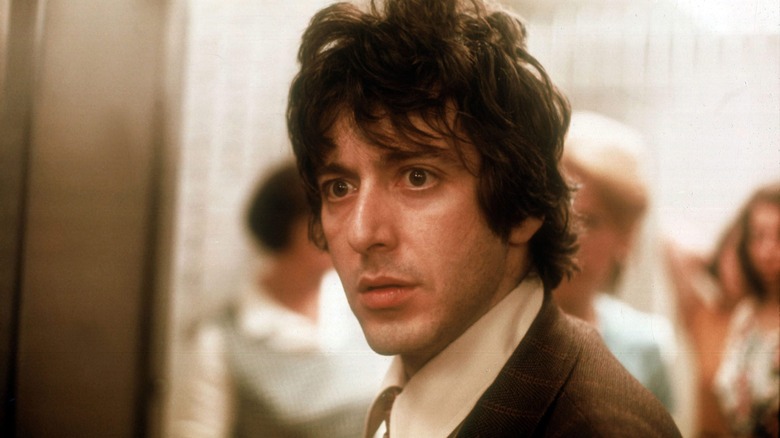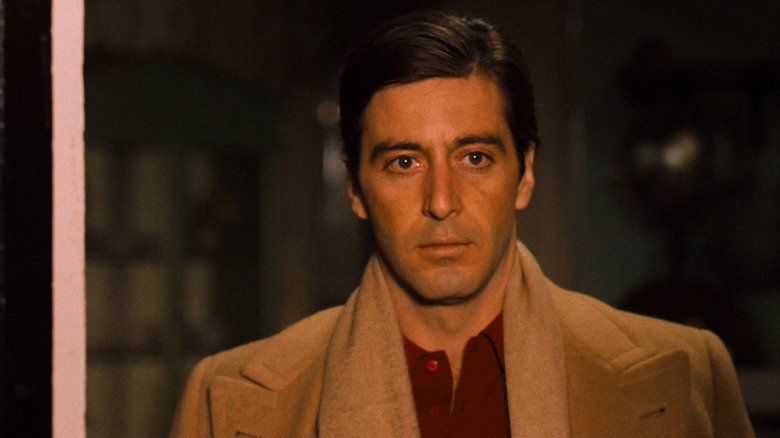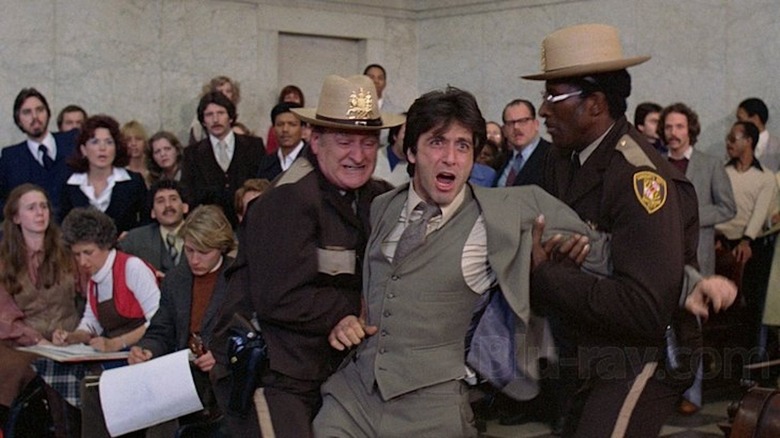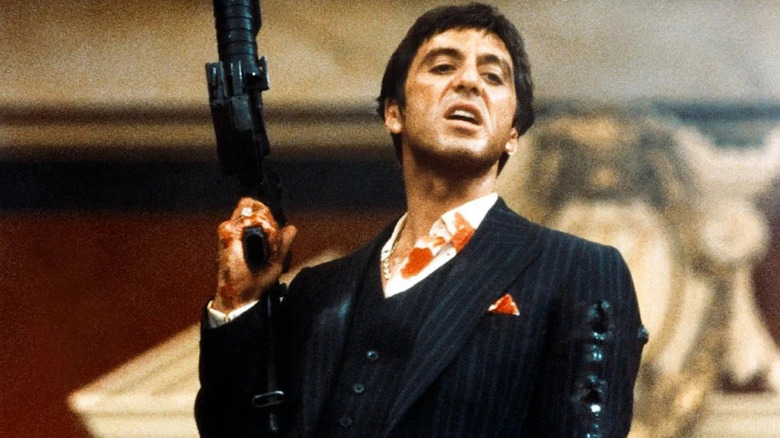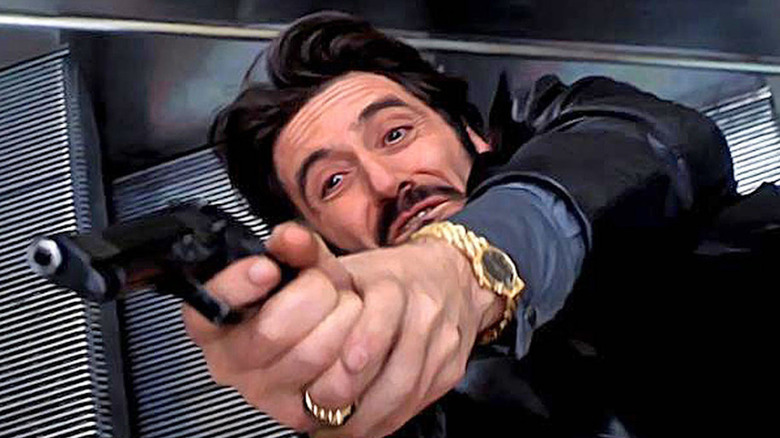Al Pacino Is The Best Actor Ever
There are two types of Al Pacino performances. The first is the kind that announced him as an acting virtuoso in the 1970s. They're fully inhabited, imbued with a coiled intensity, and forever on the verge of crescendoing to rage or, on rare occasions (most movingly in Jerry Schatzberg's "Scarecrow"), joy. This is Pacino at his very best: restless, yet modulated. When he blows his top in "Dog Day Afternoon," screaming "Attica" at the cops posted outside the bank he's attempting to rob, the moment is earned. He's given us keen insight into the mental machinery that drives Sonny, and has us cheering along with the crowd, even though we're still not sure why he's been driven to such dead-end desperation.
The second type is the grotesque self-parody that's been grist for impressionists — none better than Bill Hader — and soundboard prank callers since he stole Denzel Washington's Oscar as Vietnam vet Frank Slade in Martin Brest's "Scent of a Woman." This is when he casts off the restraints and rages Lear-like at a world that's wronged him. It's undeniably entertaining, and sometimes in character, but it's also so very easy for an actor of his boundless talent. It's sound and fury signifying a ravenous hunger for a fat paycheck. But you've got to give it to him: no one phones in a performance more loudly than Pacino.
It's this latter form of performance that has allowed some moviegoers to devalue Pacino's singular brilliance. They view him as a collection of hoary vocal tics and enunciations. They take for granted that, 51 years ago, he broke out by giving the best performance in one of the greatest movies of all time.
The breakout
Historically, it's probably more accurate to cite Schatzberg's "The Panic in Needle Park" as Pacino's breakthrough, but his portrayal of a charismatic junkie was a mere tremor compared to the seismic event that was Francis Ford Coppola's "The Godfather." Released in 1972, Coppola's classed-up adaptation of Mario Puzo's tawdry bestseller turned a stereotypical gangster yarn into a tragically nuanced family drama. The film's main attraction was, of course, Marlon Brando, the Method-acting genius who, with the help of makeup legend Dick Smith, transformed his physiognomy to play Don Vito Corleone, the aging patriarch of a powerful criminal organization. But the tragic heart and soul of the film was Pacino's Michael, a returning World War II hero with no intention of getting caught up in the family business. "That's my family, Kay," he tells his fiancée (Diane Keaton). "It's not me."
The coldness with which Pacino's Michael relates the story of his father buying out crooner Johnny Fontaine's contract drips with contempt. Michael loves his family, but he's repulsed by their business. Every time we watch "The Godfather" (which is an annual Thanksgiving tradition for many cinephiles), we buy that line delivery. And no one would be prouder to hear this than Vito. And yet we're also always gutted when, with the same coldness, Michael devises his plan to personally assassinate the men who attempted to kill his father.
In the first two "Godfather" films, Pacino is a study in the placidity of evil. Any glimmer of humanity that resided in Michael is essentially finished off by the murder of his wife Apollonia (Simonetta Stefanelli). From there, he deals from an assumption of cruelty. He trusts no one, not even family. His frigid gaze at the end of "The Godfather II," after having henchman Al Neri knock off his hapless brother Fredo, is one of cinema's most chilling moments. Michael's still satisfaction in having checkmated his adversaries is a savage portrait of American corporate excellence and a perfect metaphor for capitalism.
The career
Pacino's twin triumphs as Michael Corleone went bafflingly unrewarded by the Academy. In an amusing feat of category fraud, he was nominated for Best Supporting Actor to clear the way for Brando's Best Actor coronation in 1972 (both men boycotted the ceremony for different reasons). He was then passed over in 1974 because Art Carney was due a career achievement for playing an old fart whose cat dies in Paul Mazursky's "Harry and Tonto."
Pacino responded by dialing up the volume. Roles like Michael are rare, so it's not surprising that filmmakers were more drawn to his angsty portrayal of a victimized cop in "Serpico," Sidney Lumet's searing 1973 indictment of NYPD corruption. He was far more impressive and utterly heartbreaking as a vagabond sailor opposite Gene Hackman's ex-con in "Scarecrow."
He was at a crossroads, but so was the film industry. After Pacino's bravura and improv-heavy turn in "Dog Day Afternoon," where he seemed poised to explode off the screen in a fit of misunderstood fury, Pacino doubled down on the histrionics with Norman Jewison's gratingly self-righteous "...And Justice for All." His infamous courtroom meltdown ("You're out of order! This whole trial is out of order!") was the birth of the grandstanding Pacino. So after the sour, leather-bar slumming of William Friedkin's "Cruising," he set the thespian gold standard for overacting in Brian De Palma's "Scarface."
The career part II
Tony Montana begins and ends "Scarface" as a monster, a murderer inflicted on Miami by a troublemaking Fidel Castro. He is a funhouse mirror version of Michael Corleone: a nakedly ambitious gangster governed by unfettered urges. As he indelicately observes early in the movie, "This town is like a great big p***y just waitin' to get f***ed!" When Tony makes a play for the moll (Michelle Pfeiffer) of his chief competitor (Robert Loggia) in the Southern Florida cocaine trade, she accedes to his advances out of annoyed boredom. He has nothing to offer her but money, but she'll go where the action is.
Tony is as barking mad as Paul Muni's Tony Camonte in Howard Hawks's 1932 "Scarface," and De Palma composes his obligatory rise and fall as overheated opera. It's a perfect match of over-the-top sensibilities. But there's no ache. It's a Grand Guignol gangster flick. The scene in Mario Van Peebles' "New Jack City," where Wesley Snipes' mob kingpin nerds out on Tony's high-caliber, blaze-of-gory finale, is a sharp, meta critique of the film's failings. It's freakishly aspirational. De Palma and Pacino are showing off, and while it's one hell of a show, we leave the movie feeling nothing but relief. Tony was always awful, and we're ultimately exhausted by his company. Pacino is, technically, masterful, but this is an aria of nothing but high notes.
Pacino could do better. De Palma could do better. 10 years later, we got both of them at their very best.
The defining performance
Pacino took a hiatus after starring in Hugh Hudson's 1985 flop "Revolution," and returned four years later in peak form as a fried cop in Harold Becker's erotic thriller "Sea of Love." He was a garish gas as Big Boy Caprice in Warren Beatty's "Dick Tracy," and a spectacular showboat as Ricky Roma in James Foley's "Glengarry Glen Ross," but his Michael Corleone in "The Godfather Part III" was a discordantly sentimental departure from the first two installments. He's fine in the context of what Coppola's doing, but we're missing some vital connecting tissue. As for "Scent of a Woman," Slade is as humanly plausible as Tony Montana.
Pacino delivered two sensational performances in Michael Mann's "Heat" and "The Insider," but I think his co-stars (Robert De Niro and Russell Crowe) walked off with those movies. It's "Carlito's Way" where he wedded the vulnerability of his early-career characters with the "hoo-ah" excesses he'd been indulging since "...And Justice for All."
Carlito Brigante is a murderer. He's just been released from jail. He wants to go legit, but when he returns to his old New York City neighborhood, he's dragged into a drug deal gone wrong. Carlito's savvy. He dumps the gun and steers clear of the incident. Alas, his corrupt lawyer (Sean Penn) is plunging deep into the underworld he's forsworn. All Carlito wants to do is marry the love of his life (Penelope Ann Miller) and retire to the bliss of the Caribbean. But the old reflexes never subside. He's a gangster. And as long as he lives by this code, he is, as the genre dictates, doomed.
Pacino's Carlito is not a psychopath. He's a man who shows strength when needed, but he's capable of tremendous tenderness. Pacino barks and seduces. He's both fearsome and vulnerable. He's a sinner trying to get right in a universe that has already condemned him. He knows he's screwed, but he plays his losing hand with vigor.
Pacino can't win. His best characters rage and connive and bargain, but they lose, even when they win. What gets broken in a great Pacino film doesn't go back together.
